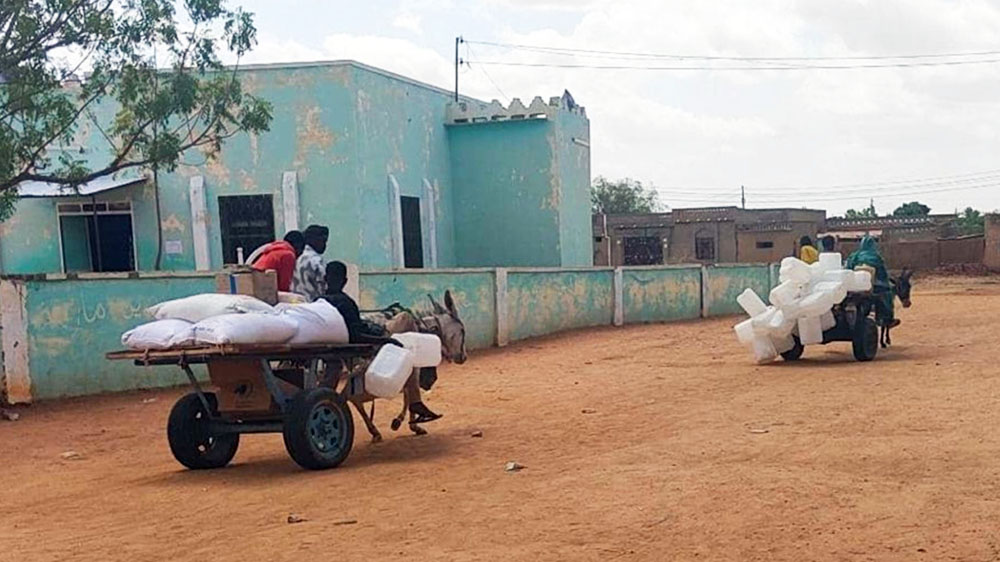
Sudan: Al-Obeid Under Siege
By Qureshi Awad
The city of Al-Obeid has been enduring a siege imposed by the Rapid Support Forces (RSF) since the onset of the war, resulting in the failure of the agricultural season for the second consecutive year despite favorable rains. Organizations like Livelihood Means failed to rescue the winter crop season with alternative plantings to compensate for previous losses.
However, the Ministry of Natural Resources managed to deliver winter seeds and mid-level technology, enabling farmers to cultivate this years winter season, particularly watermelon. Yet, the mentioned forces have blocked the entry of these products into Al-Obeid. Some families have tried to offset the shortage by producing homemade jabarik bread.
The inability of village products to reach markets has paralyzed life in these areas. This disruption has halted professions such as portering, food vending, and coffee sales.
Moreover, the presence of RSF along the Sennar–Jebel Moya route has obstructed the transport of livestock from Gedaref and the Blue Nile, regions upon which western Sudan relies—stretching from the White Nile border to the Libyan frontier. Notably, the Kordofan and Darfur regions produce oilseeds but depend on central and eastern Sudan for millet and sorghum, the staple foods for much of the population.
Due to the roads dangers, large transportation companies have ceased operations, leaving 5,000 workers unemployed. Consequently, maintenance workshops have also shut down.
Previously, dozens of large trucks with 60-ton capacity entered the crop markets, but now only two smaller 7-ton trucks arrive twice a week. According to one crop trader, the market currently operates at only 10% of its capacity, leading to soaring sorghum prices, with a malwa (traditional measure) of sorghum reaching 12,000 SDG in Al-Obeid’s market and 22,000 SDG in Delinj.
Additionally, food distribution companies have closed their doors, major wholesale traders have migrated, and prominent shops have shuttered. In their place, a new class of traders has emerged, migrating from towns where life has come to a halt, such as Umm Rawaba and Rahad. Informal street markets now dominate areas previously home to established commercial outlets.
Goods that do reach the city are subjected to exorbitant protection fees imposed by some tribal groups providing safe passage, costing billions of Sudanese pounds and directly inflating commodity prices to unprecedented levels.
The siege, coupled with a power outage, has severely impacted meat supplies. RSF forces reportedly detained more than 600 livestock in the Maytan area en route from Al-Hajiz and Abu Zabad, negotiating with their owners. Consequently, most butcheries in the city have closed, and uninspected slaughtering, known as kiri, has become widespread.
The most catastrophic impact of the siege is on the flow of medicines and medical supplies, which require specific storage conditions that the RSF lacks expertise to handle. As a result, many drugs have expired. Additionally, the inability to deliver spare parts has partially paralyzed the only dialysis center in western Sudan after facilities in Darfur and Kordofan ceased operations. Despite high demand, particularly after the occupation of Wad Madani, the center operates only 13 dialysis machines out of 26 initially available when it opened in 2014.
The levies imposed by the RSF have drained the local market of liquidity, as cash has been funneled out of the city, leaving banks empty. This situation has given rise to a flourishing high-interest informal currency trade.
The environmental impact of the siege has been devastating. Fuel distribution centers and gas stations have ceased operations due to RSF blockades, forcing households and bakeries to rely on firewood and charcoal. Even this has become scarce, leading to the cutting down of neem trees along city streets and the establishment of charcoal kilns in residential areas.
It is worth noting that Al-Obeids tree-planting campaign, which began in the 1950s under the leadership of the Kordofan newspaper, emerged from a public forum in the city. The aged trees provided shade for public gatherings and served as a recreational space for the city’s youth. Today, however, this legacy is under threat.

